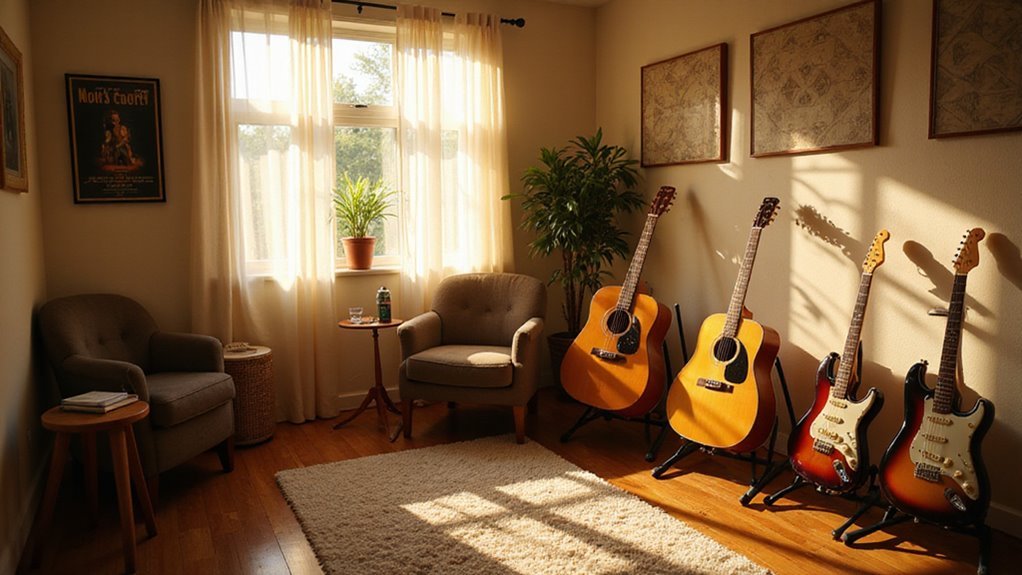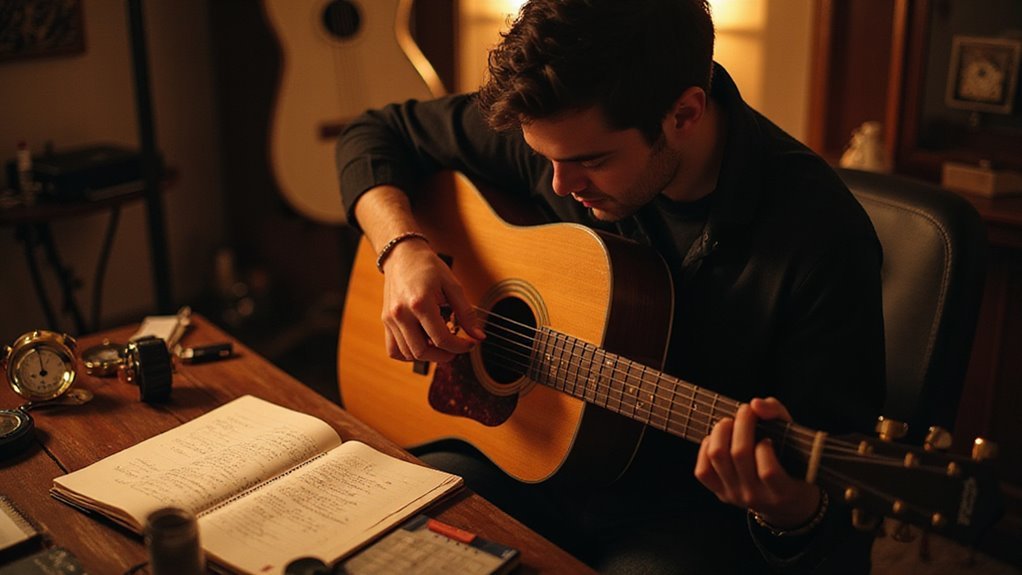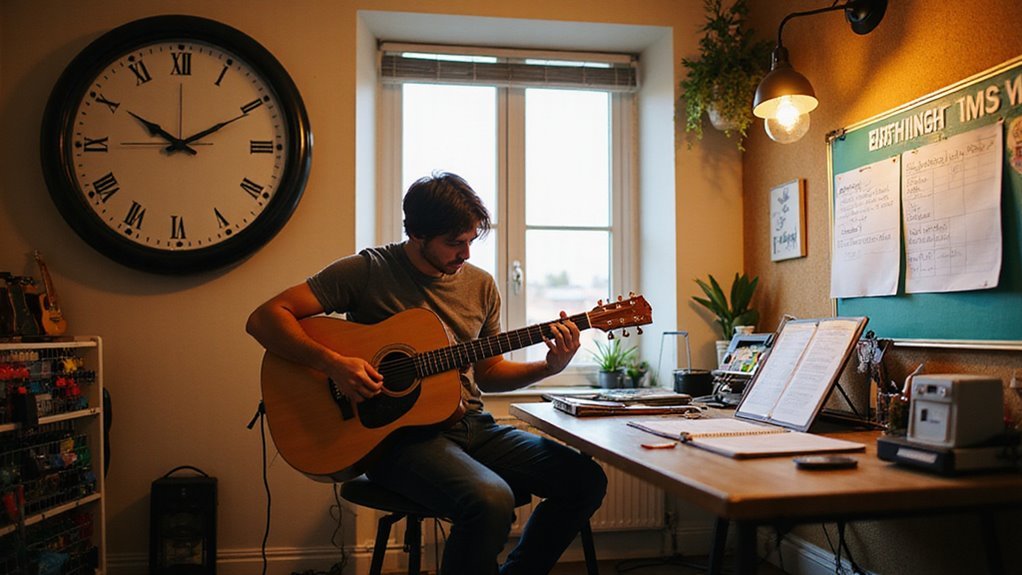Let’s face it: your guitar sessions might not be hitting all the right notes lately. You want to improve, but something feels off about your practice routine. I’ve been there too—spending hours playing without making real progress. Perhaps it’s not about practicing longer, but smarter. By setting up the right environment, establishing clear goals, and managing your time effectively, you’ll transform those frustrating sessions into productive ones. Ready to access your potential?
Setting the Stage: Creating Your Optimal Practice Environment

While you might be tempted to practice guitar just about anywhere, creating the right environment can dramatically improve your practice sessions. Find a quiet space where you won’t be interrupted and, if possible, keep your guitar easily accessible—you’re more likely to practice when you don’t have to unpack everything first.
Good lighting is essential, I think, especially when reading music or checking finger positions. Perhaps add a comfortable chair without armrests so your elbow can move freely.
Some guitarists even create a dedicated practice corner with all their gear neatly arranged.
The right space isn’t just practical—it signals to your brain that it’s time to focus and connect with your instrument.
The Power of Goal-Setting for Rapid Guitar Improvement

The act of setting goals transforms aimless guitar strumming into deliberate practice with purpose and direction. When you establish specific, achievable targets—like mastering that tricky chord change by next Tuesday—you’re fundamentally creating a roadmap for success.
Targeted practice replaces random strumming, turning casual players into skilled guitarists through intentional development.
I think the most effective approach is setting both short and long-term goals. Perhaps try breaking down that challenging solo into manageable chunks rather than tackling it all at once.
It’s not just about the destination, though. The journey matters too.
Remember to celebrate your wins, even small ones. We guitarists all need those moments of validation to keep our motivation burning.
Time Management Strategies for Effective Practice

Three key elements make the difference between productive guitar practice and just spinning your wheels: when you practice, how long you practice, and what you do during that time. Finding your ideal practice window—whether you’re a morning person or night owl—can dramatically improve your focus and retention.
| Time Block | Activity | Duration |
|---|---|---|
| Warm-up | Scales & technique | 5-10 min |
| Focus work | Problem sections | 10-15 min |
| Fun zone | Songs & improvisation | 10+ min |
I think most of us struggle with consistency more than anything. Rather than perfect hour-long sessions, aim for realistic, sustainable practice that fits your life.
Breaking Down Technical Barriers in Your Playing
Technical barriers can frustrate even the most dedicated guitarists, often creating roadblocks that seem impossible to overcome.
Don’t worry—we’ve all been there! The key is breaking these challenges into manageable pieces.
When you’re facing a difficult passage or technique, slow it down dramatically.
I think practicing at 25% speed with perfect form builds better muscle memory than rushing.
Perhaps try isolating just one measure or even a single chord shift that’s giving you trouble.
Tracking and Celebrating Your Musical Journey
Documenting your progress as a guitarist isn’t just helpful—it’s transformative for your musical development. Whether through journal entries, recordings, or photos, tracking your journey provides tangible evidence of growth that might otherwise go unnoticed.
| Tracking Method | Benefit | How Often |
|---|---|---|
| Practice Journal | Identifies patterns | Daily |
| Video Recording | Shows technique improvements | Weekly |
| Audio Demos | Captures tone development | Monthly |
Remember to celebrate the small victories too! That chord change you finally nailed or the song that once seemed impossible—these moments deserve recognition. I think acknowledging progress, however modest, keeps your motivation flowing when the learning curve gets steep.
Beyond Repetition: Keeping Your Sessions Fresh and Engaging
While practice requires repetition to build skills, endless drilling can quickly lead to burnout and diminished motivation.
Mix things up by alternating between technical exercises, learning new songs, and simply playing for fun. I think we sometimes forget that enjoyment is what brought us to guitar in the first place.
Try incorporating different genres or techniques you’ve never explored before.
Perhaps learning a flamenco pattern or blues lick will reignite your passion. Challenge yourself with backing tracks or apps that gamify practice.
Frequently Asked Questions
How Do I Prevent Hand Injuries During Long Practice Sessions?
Take regular breaks, maintain proper hand position, stretch before playing, and avoid excessive tension. Keep your wrist straight and build endurance gradually. You’ll protect your hands while improving technique.
Should I Practice Guitar Before or After Other Instruments?
Just as juggling instruments requires balance, you’ll benefit most by practicing guitar when you’re fresh. Switch between instruments to prevent fatigue. Many musicians find morning guitar sessions followed by other instruments works well.
Can Too Much Theory Knowledge Hinder Creative Playing?
While too much theory focus can sometimes lead to overthinking, it’s usually beneficial. You’ll find that well-integrated theory knowledge actually enhances your creativity by giving you more expressive options to explore.
How Do I Transition From Practicing Exercises to Actual Songs?
Practice practical pieces progressively. Start with simpler songs that use your exercise techniques, then gradually tackle more complex tunes. You’re building bridges between skills and application—this is your musical journey unfolding naturally.
When Should I Consider Investing in a Better Guitar?
You should upgrade your guitar when your current one limits your playing, you’re committed to long-term practice, and you notice tone differences. A better instrument often inspires more practice.
Conclusion
You’ve now got all the tools to take your guitar practice from zero to hero. Remember, consistency beats intensity every time. Set your space, define your goals, manage your time wisely, and tackle those tricky techniques head-on. By tracking your journey and keeping things fresh, you’ll watch your skills soar. Now pick up that guitar—your musical adventure is waiting for you!